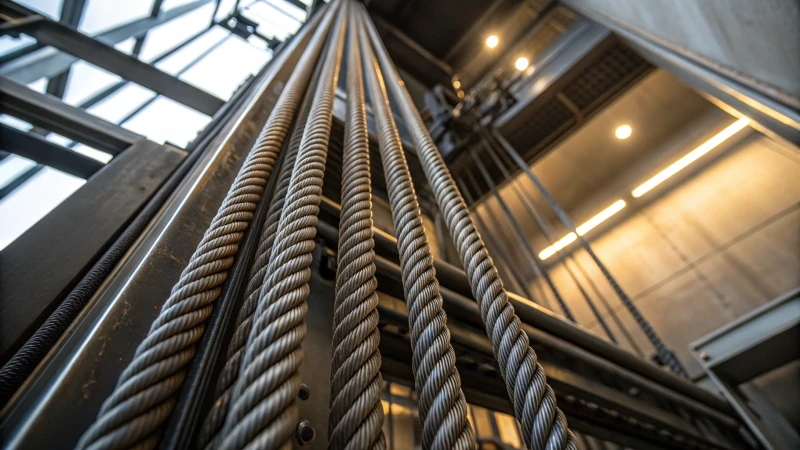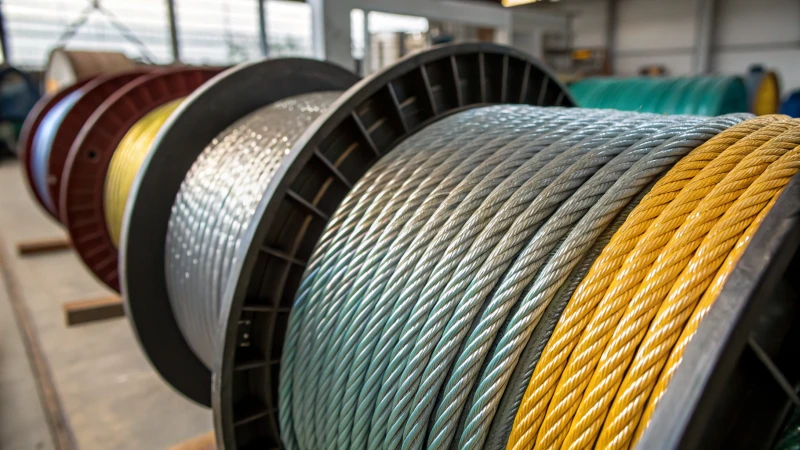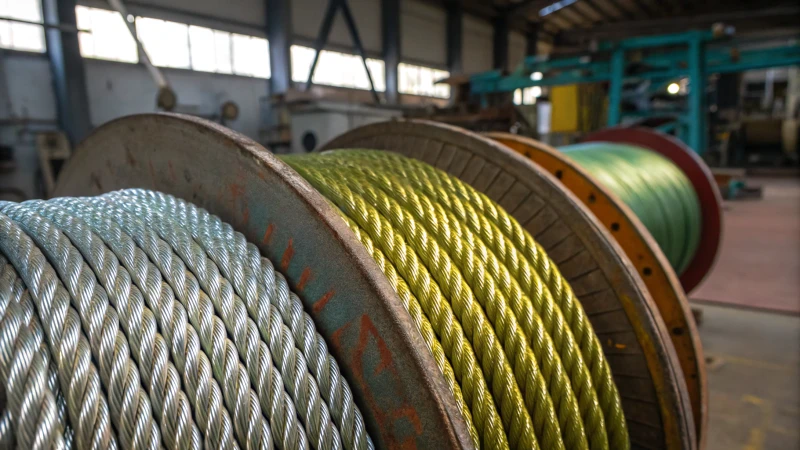
Ever wondered how something as simple as a coating can be a game-changer for elevator safety?
Elevator steel wire rope coatings, like galvanization and polymer layers, boost corrosion resistance by shielding against moisture, salt, and pollutants. Galvanization adds a zinc layer that enhances resistance by up to 30%, while polymers such as polyurethane deliver excellent impact and abrasion protection.
Now, I remember the first time I dove into the world of steel wire ropes. It was during a major construction project where every detail mattered, especially the tiny details that kept everything running smoothly and safely. Learning about these coatings was eye-opening. They’re not just about a layer of paint; they’re about engineering a solution that stands up to the harshest environments. From the precise application techniques to the rigorous testing processes, each coating type offers unique advantages, proving indispensable in prolonging the life of elevator ropes. It's fascinating how these coatings can truly transform the reliability and longevity of crucial components.
Galvanization improves steel rope corrosion resistance by 30%.True
Galvanization applies a zinc coating, enhancing resistance to rust by 30%.
Polyurethane coatings offer less abrasion resistance than galvanization.False
Polyurethane provides superior impact and abrasion resistance compared to galvanization.
What Are the Most Effective Coatings for Elevator Steel Wire Ropes?
When I first delved into the world of elevator maintenance, the maze of coatings for steel wire ropes was both intriguing and overwhelming. Here's what I discovered along the way.
The best coatings for elevator steel wire ropes are galvanization, PVC, and polyurethane. Galvanization excels in corrosion resistance, while PVC and polyurethane offer robust environmental and mechanical protection.

Understanding Coating Types and Their Benefits
I remember the first time I had to choose a coating for an elevator steel wire rope. It felt like choosing the right armor for a battle—only this armor had to last against rust, wear, and tear. Each type of coating has its unique strengths that can make a significant difference in performance.
-
Galvanization is like giving the steel a suit of armor made of zinc. I was particularly impressed by how it held up in damp or polluted areas, thanks to its outstanding corrosion resistance. According to ISO 4344 standards1, galvanized ropes show up to 30% better resistance to corrosion than their uncoated counterparts.
-
Polymer Coatings, like PVC and polyurethane, bring additional perks to the table. PVC is the budget-friendly option with decent chemical resistance2. But if you're looking for something that can take a beating, polyurethane is your go-to. It excels in impact and abrasion resistance, perfect for those rough-and-tumble environments.
Comparing Coating Performance
| Coating Type | Corrosion Resistance | Impact Resistance | Abrasion Resistance |
|---|---|---|---|
| Galvanization | High | Moderate | Moderate |
| PVC | Moderate | Low | Low |
| Polyurethane | High | High | High |
Application-Specific Considerations
One time, I was working on a project near the coast, and let me tell you, the salty air was brutal on materials. This is where polymer coatings really shine. Ropes with these coatings have been shown to last up to 40% longer in challenging environments.
-
Marine Conditions: Saltwater is unforgiving, but polyurethane's chemical stability makes it a champion in these settings.
-
Heavy Load Operations: When dealing with heavy loads, you can't compromise on impact resistance. Polyurethane-coated ropes are built to endure the toughest of conditions, ensuring longevity and durability.
Conclusion
Choosing the right coating isn't just about picking what's available; it's about understanding what your specific environment demands. Each coating has its strengths, and knowing these can help ensure your elevator's wire ropes are both protected and long-lasting.
By tailoring your choice to the operational demands and environmental conditions you face, you can enhance both the safety and efficiency of your elevator systems. For more detailed insights on maintenance, check out our guide on elevator system optimization3.
Galvanized ropes resist corrosion better than uncoated ropes.True
Galvanized coatings offer up to 30% better corrosion resistance.
PVC coatings are more impact-resistant than polyurethane.False
Polyurethane has superior impact resistance compared to PVC.
What’s the Difference Between Galvanization and Polymer Coatings?
Ever wondered if your steel wire ropes could stand the test of time in harsh conditions? Choosing the right coating can make all the difference.
Galvanization and polymer coatings both boost steel wire ropes' corrosion resistance but serve different roles. Galvanization adds a protective zinc layer, while polymer coatings, such as PVC or polyurethane, provide excellent abrasion and impact resistance.

The Basics of Galvanization
I remember my first project involving galvanized ropes. It was for an elevator system in a bustling office building. Seeing how the zinc layer held up against the relentless humidity was a game-changer. Galvanization creates a sturdy barrier that excels in high-humidity or salty environments, like those encountered in coastal constructions. According to ISO standards4, these ropes resist corrosion 30% better than their uncoated counterparts, making them ideal for long-term applications.
Understanding Polymer Coatings
Then there was that time in the mining sector when I discovered polymer coatings. Picture this: harsh, dusty terrains where machinery is constantly battered by debris. Here, polymer coatings, such as PVC and polyurethane, are your best allies. They envelop the steel wire in a flexible, tough layer that’s almost like giving them a superhero’s cape. These coatings shine by adding up to 40% more life to ropes, especially in marine settings. I’ve seen polyurethane5 perform marvelously under such grueling conditions.
| Coating Type | Primary Benefit | Ideal Environment |
|---|---|---|
| Galvanization | Corrosion Resistance | Humid/Salt-prone |
| Polymer | Impact Resistance | Marine/Industrial |
Cost Considerations
Initially, I thought galvanization was the way to go due to its lower upfront costs. But as I delved deeper into cost analyses, it became clear that polymer coatings might offer better long-term value in certain scenarios. A thorough cost analysis6 can be illuminating.
Application Specifics
In construction, where durability and safety are paramount, galvanized ropes are often sufficient for standard needs. But John, a procurement manager I once worked with, found that certain challenging projects required the resilience of polymer coatings.
Emma, my colleague from the mining sector, swears by polyurethane for its exceptional abrasion resistance7. The choice between galvanization and polymer coatings heavily depends on specific operational demands and environmental factors.
By exploring these options thoroughly, you ensure your project benefits from the right mix of cost-efficiency, durability, and performance.
Galvanized ropes resist corrosion 30% better than uncoated ropes.True
According to ISO standards, galvanized ropes have a 30% better resistance.
Polymer coatings are primarily used for corrosion resistance.False
Polymer coatings excel in abrasion and impact resistance, not just corrosion.
What Environmental Factors Affect the Corrosion of Steel Wire Ropes?
I remember the first time I saw a steel wire rope—it was during my first job on a construction site, and I was amazed by its strength. But I quickly learned that even these mighty ropes can succumb to environmental elements.
Humidity, salt exposure, and industrial pollutants are key environmental factors that cause steel wire ropes to corrode. Using protective coatings and regular maintenance can significantly reduce corrosion and extend their lifespan.

Humidity and Temperature Variations
One summer, we had a project near the coast where the humidity was through the roof. I could almost feel the air sticking to my skin, and it made me realize how similar conditions affect steel wire ropes. High humidity accelerates corrosion by increasing oxidation, especially when combined with temperature swings that cause expansion and contraction.
Learn more about humidity's impact8
Salt Exposure
Working near the ocean, I saw firsthand how salt exposure could wear down steel in no time. Steel wire ropes in marine environments face this relentless enemy. Regular cleaning and inspections are critical to prevent salt deposits from hastening corrosion.
Explore salt exposure effects9
Industrial Pollutants
I remember standing near an industrial site, watching plumes of smoke rise into the sky. Those airborne pollutants can settle on steel surfaces, leading to corrosive chemical reactions. Using galvanized or polymer-coated ropes offers a robust line of defense.
Industrial pollution effects10
Coatings and Protective Measures
During a workshop, I once handled both galvanized and uncoated ropes. The difference was striking—galvanized ropes felt more resilient. Adding protective coatings like galvanization or polymers significantly enhances resistance to corrosion.
| Coating Type | Corrosion Resistance |
|---|---|
| Galvanized | Up to 30% better |
| Polymer (e.g., PVC) | Up to 40% longer life |
Understand protective coatings11
Maintenance Practices
Routine maintenance is something I always emphasize, almost like clockwork checks on an old car. Regular inspections, cleaning, and lubrication not only prolong the life of steel wire ropes but also help catch potential issues early.
Humidity accelerates corrosion in steel wire ropes.True
High humidity promotes oxidation, increasing the corrosion rate.
Galvanized ropes are less corrosion-resistant than uncoated ropes.False
Galvanized ropes offer up to 30% better resistance.
How do coating technologies extend the lifespan of elevator ropes?
Ever wondered how those trusty elevator ropes manage to stay strong and reliable over time? Dive into the world of coating technologies that keep them running smoothly.
Coating technologies like galvanization and polymer coatings significantly extend the lifespan of elevator ropes by enhancing corrosion resistance and shielding against environmental factors. Galvanized ropes resist corrosion up to 30% better, while polymer coatings increase durability by 40% in harsh environments.

Galvanization: A Traditional Approach
I remember the first time I learned about galvanization in an old workshop my uncle ran. The process seemed like magic to me—coating steel with zinc to protect it from the relentless march of corrosion. It's a time-tested method, offering a robust shield against moisture and pollutants. According to ISO 4344, galvanized ropes12 boast up to 30% better resistance to corrosion than their uncoated counterparts.
| Attribute | Uncoated Steel | Galvanized Steel |
|---|---|---|
| Corrosion Resistance | Low | High |
| Durability | Moderate | Increased |
| Maintenance Needs | Frequent | Reduced |
Polymer Coatings: Advanced Protection
When I first heard about polymer coatings, it was during a project that involved harsh marine environments. I was skeptical at first, but seeing these coatings in action changed my mind. Polymer options like PVC and polyurethane offer superior protection through impact and abrasion resistance. These coatings shine in places with high humidity or saltwater exposure, with data showing that polymer-coated ropes13 can last up to 40% longer than uncoated ones.
| Coating Type | Benefits | Usage |
|---|---|---|
| PVC | Impact Resistance | General Use |
| Polyurethane | Superior Abrasion Resistance | Harsh Environments |
Comparing Coating Options
Choosing the right coating isn't just about picking the latest technology; it's about understanding the environment and operational demands. Galvanization may be more cost-effective for some projects, but polymer coatings can offer unmatched protection in challenging conditions.
- Environmental Factors: Consider humidity, pollution levels, and salt exposure.
- Cost vs. Benefit: Weigh initial costs against long-term maintenance savings.
- Regulatory Compliance: Ensure adherence to safety standards both locally and internationally.
Each coating choice comes with its own set of perks and challenges. By grasping these nuances, we can make informed decisions to boost the longevity and performance of our elevator ropes. For more insights on material selection14, explore best practices across various industrial settings.
Galvanized ropes resist corrosion 30% better than uncoated ropes.True
Galvanization provides a zinc coating, enhancing corrosion resistance by 30%.
Polymer-coated ropes last 50% longer in marine environments.False
Polymer-coated ropes last up to 40% longer, not 50%, in marine settings.
Conclusion
Elevator steel wire rope coatings, including galvanization and polymers, enhance corrosion resistance and durability, significantly extending the lifespan of ropes in harsh environments.
-
Understand ISO 4344 standards to ensure compliance and safety in elevator rope usage. ↩
-
Explore why PVC is favored for its chemical resistance in various industrial applications. ↩
-
Explore methods to optimize elevator systems for improved efficiency and safety. ↩
-
This link provides standards that define quality benchmarks for galvanized ropes, essential for ensuring compliance and performance. ↩
-
Understanding why polyurethane is favored helps make informed decisions regarding abrasion-resistant materials. ↩
-
Evaluating cost differences aids in selecting the most economical option over the product's lifecycle. ↩
-
Learn why polymer coatings excel in harsh environments to make better procurement choices. ↩
-
Explore how varying humidity levels contribute to the corrosion process and what measures can be implemented for protection. ↩
-
Discover the specific impacts of salt exposure on metals, particularly in marine environments, and potential preventive strategies. ↩
-
Understand how industrial pollutants accelerate corrosion through chemical reactions and methods to combat these effects. ↩
-
Learn about various coatings that improve corrosion resistance, including galvanization and polymer options. ↩
-
Galvanized steel ropes offer improved corrosion resistance, which is vital for extending the lifespan of elevator ropes. ↩
-
Polymer coatings provide superior protection against environmental factors, enhancing durability. ↩
-
Understanding material selection helps optimize rope performance for specific industrial applications. ↩

